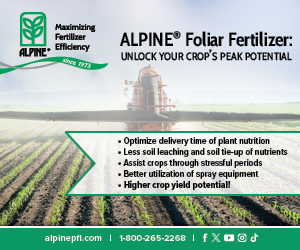Verifying sustainability
BRINGING THE FARM VOICE TO THE SAI PLATFORM
AGRICULTURE IS ARGUABLY the most important stakeholder in the food value chain. That’s why, when Grain Farmers of Ontario heard about a new global food industry initiative, with a mission to develop a standard set of sustainable agriculture practices, they joined the table.

The only commodity organization in Ontario to join the Sustainable Agricultural Initiative (SAI) Platform, Grain Farmers of Ontario is an affiliate member bringing the voice of farmers to an organization dominated by large corporate stakeholders including Unilever, McDonalds, Nestle, Danone, and McCain’s. The SAI Platform brings together members who share, at a precompetitive level, knowledge and ideas to support implementing sustainable agricultural practices. The group is made up of member companies and organizations that purchase products from farmers around the world and can influence farming practices in every agricultural producing country.
“We’ve come a long way, since the SAI Platform was created in 2002, when key stakeholders in the food value chain joined to support and promote sustainable agriculture,” says Peter-Erik Ywema, SAI Platform General Manager. “But there’s still a lot to be done, and one of our challenges is how to best and most effectively partner with farmers to advance sustainable agriculture.”
Ywema is thrilled to welcome Grain Farmers of Ontario to the SAI Platform, saying the group hopes to learn insights from the commodity organization and its grassroots and practical approach to engaging farmers.
GRASSROOTS REPRESENTATION
“Sustainable farming practices and the impending on-farm verification of these practices is on our radar,” says Nick Betts, Grain Farmers of Ontario’s market development coordinator – environment and sustainability. “Ontario farmers already implement many sustainable practices, like crop rotation, responsible fertilizer application, and water management. It’s important influential organizations like SAI understand agriculture, before imposing a top-down approach to sustainable production regulations.”
Betts believes large food value chain stakeholders will soon require verification of sustainable farming practices from their producers and Grain Farmers of Ontario wants to make sure farmers have a voice in the development of regulations.
“If farmers are required to follow sustainable production regulations, or a verification process, we want to be part of the discussion to make sure regulations or requirements are practical, responsible, and reflect modern farming practices,” he says.
The SAI Platform members meet regularly to share knowledge, identify issues, and generate business solutions for sustainable agriculture. Members are organized into five working groups — arable and vegetable crops, beef, coffee, dairy, and fruit. Grain Farmers of Ontario representatives sit on the arable and vegetable crops committee. In addition, the organization is also part of the biodiversity, farmer, and supplier partnership and farmer sustainability assessment committees. Betts says Grain Farmers of Ontario has three important roles when representing Ontario corn, soybean, and wheat farmers on the SAI committees — voice their interests, bring a farm-level perspective, and gain market insight and build networks with policymakers and marketing influencers who affect sustainable production requirements.
By providing advice and being a resource to SAI organization members and committees, Grain Farmers of Ontario wants to help the SAI Platform shape global sustainable agriculture through a continuous on-farm improvement process that allows for easy, flexible adoption by farmers, worldwide. The SAI Platform has already developed a set of global regulations and standards for farmers to help food companies source sustainably produced agricultural products. “The challenge of creating one set of global regulations is to put all farmers on a level playing field,” says Betts. “It’s hard to compare production practices of a two acre coffee farmer in Kenya to a 2,000 acre soybean farmer in Ontario.”
Ywema says the group expects the SAI Platform can be instrumental in providing hands-on guidance and tools for evaluating and improving farm sustainability. Through a series of committees and input from SAI members, suppliers, farmers, and external stakeholders, the organization has developed a streamlined approach to voluntary verification — the Farm Sustainability Assessment (FSA 2.0). Combining environmental, social, and economic aspects, the FSA 2.0 is described as a simple tool to assess farm sustainability using a scoring mechanism.
The FSA 2.0 assessment is available at www.saiplatform.org and free to use for anyone interested in assessing their on-farm sustainability.
“Ontario farmers shouldn’t be concerned about these assessments — it may require more paperwork, but verification could become just another step in producing the highest quality, safest Ontario products,” explains Betts. “Our greatest fear is a series of different verification standards for each crop or for each buyer. We need one set of standards that’s flexible and easy for farmers to adopt, no matter where you are or what you grow. And by working with the SAI Platform and their influential members, we can take a streamlined approach by helping shape and approve one globally-accepted sustainable production standard.”
ON-FARM VERIFICATION
Many end users, or food companies, are expected to implement voluntary sustainable production verifications — some as soon as 2016 for soybeans. “Sobeys has already said they want all their soybeans sourced from sustainably produced farmers by 2020,” says Betts.
It is unlikely Ontario farmers will realize premiums from sustainable production verification, but it could help Ontario growers gain international markets, or at least retain current markets if practices can be verified, predicts Betts. •

















